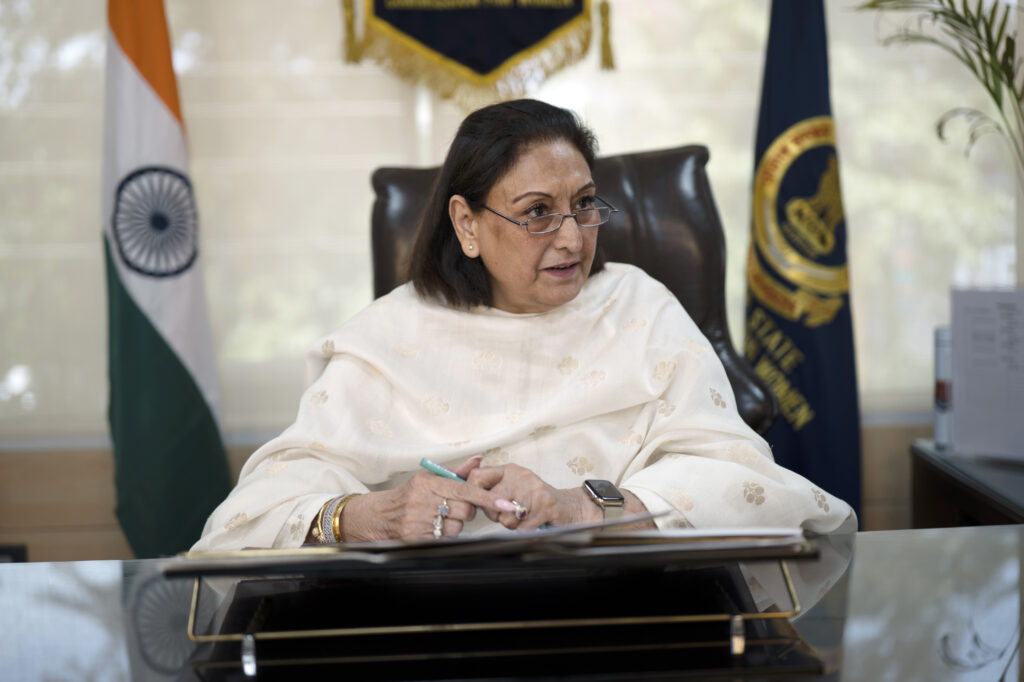From grassroots activism to state leadership, Punjab’s fearless daughter is rewriting what it means to be in power.
By Gurleen Kaur
She didn’t plan to be here. In fact, Raj Lali Gill and her husband had returned from abroad simply to wind up their property affairs. But fate had a bigger plan—and a poster. A walk past a signboard of the Aam Aadmi Party led to a conversation. That conversation led to a meeting. And that meeting led to a movement.
“I volunteered, and that was the day my journey started,” she recalls, her voice unwavering.
Today, as the Chairperson of the Punjab State Women Commission, Raj Lali Gill sits in a position that not only wields power but redefines it—through empathy, action, and accountability. Her political journey began not in air- conditioned halls, but on mats at roadside meetings. She was among those who bore the brunt of lathi charges and water cannons during protests. “When that happened, my determination only grew stronger,” she says. “We knew change would be hard, but it was necessary.”
Struggle didn’t scare her. Injustice did. Unlike many activists, Raj Lali Gill didn’t enter public service because of personal suffering. “My life was full of love and respect,” she shares. “But that made me ask—why can’t everyone live with dignity too?”What moved her was the silent suffering of women in rural Punjab—women who managed homes, families, and fields, but never felt heard.

While women in politics often speak of gender bias, Raj Lali Gill offers a surprising perspective: “It’s a myth. My male staff respects me deeply. In fact, they bring their daughters to meet me.” Leadership, she believes, is about the environment you create—fair, firm, and inclusive.
Raj Lali Gill doesn’t shy away from complex issues. In one of her only LGBTQ+ cases from a rural background, a girl persistently sought to live with her partner. “Her eyes never met mine—but her voice was firm. She had even faced abuse at home.” Gill admits, “These cases are delicate. You can’t force someone—but they also need support and understanding.”
When rural women couldn’t come to her office, she went to them. “They had responsibilities, kids, travel issues. So, I decided to go myself. And when I looked into their eyes—I saw dreams. Dreams waiting for a chance.” She initiated cluster programs to train women in skills like knitting, embroidery, and pickle- making. “Financial independence is the foundation of empowerment,” she asserts.
Through the Commission, these women now receive resources, training and legal assistance-all by simply reaching out via their block leaders or the official helpline.
Having visited nine jails across Punjab, Gill has met women booked under harsh charges-some as young as 20, including some pregnant inmates and foreign nationals duped by fraudulent immigration firms. “We fought for their bail. We even helped one woman, a dentist with a newborn, who had nowhere to go.”
With her intervention, that mother found shelter, a laptop, and a fresh start. “Sometimes, even education doesn’t save you—family does. And when that fails, we step in.”
Raj Lali Gill is clear: “In my Commission, there’s no VIP culture.” Whether it’s a celebrity or a commoner, every case is treated equally. Her team prioritizes urgent cases—rape, elder abuse, and domestic violence—over headline- driven complaints. “No MLA or minister’s referral works here,” she adds firmly. “Decisions are based on facts, not faces.”
On runaway couples, she reflects on changing dynamics. “Earlier girls ran away in fear. Now, they issue ultimatums. But skipping dialogue with family often leads to regret.” Her advice? “Talk to your parents. Their protection is irreplaceable.”
A young dentist with a newborn, abandoned by her husband and rejected by her own brother—that’s the case that lingers. “She cried silently. She had qualifications but no support.” Gill ensured she was placed in a one-stop center and guided back to stability.
“That’s when I realized— degrees don’t matter if no one stands by you.”
“When I Looked Into Their Eyes, I Didn’t See Helplessness— I Saw Dreams Waiting To Be Awakened.”
“After Nirbhaya, the law changed. But justice delayed is justice denied,” she says, advocating capital punishment for brutal sexual crimes and fast-track courts, especially in live-in relationship cases. “Exemplary punishment is necessary to set precedent.” To young women chasing careers, her advice is simple and heartfelt: “Spend time with your family. One meal a day. One weekend together. The family that eats together, stays together.”
Raj Lali Gill isn’t just holding a chair. She’s holding the line—for justice, for women, for those who’ve never been heard. Her journey proves that strength doesn’t always roar. Sometimes, it walks in, listens, and quietly changes the world.
For help or to reach the Punjab State Women Commission:
Official helpline & office details available via block panchayats or the Commission’s website.


